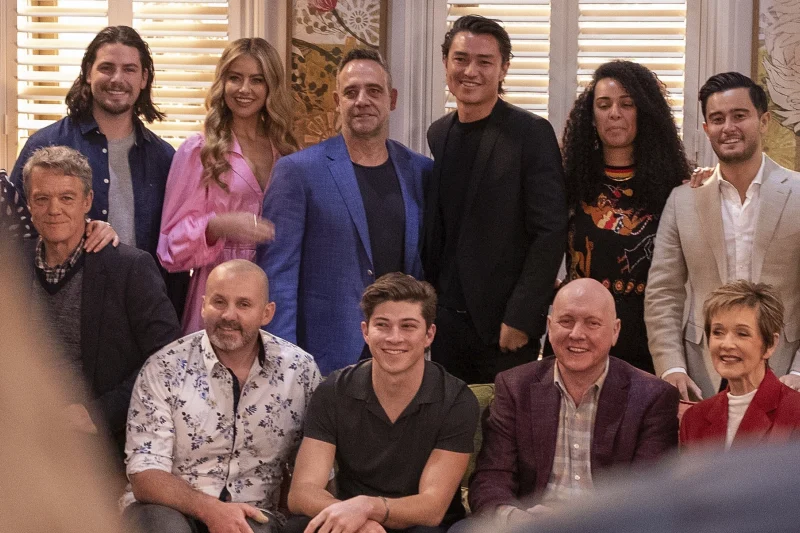We have all lived next door to the Ramsays, Robinsons, and Clarkes for about 40 years, and then the Mitchells, Kennedys, Rebecchis, Starks, and Cannings. According to the theme song, this is how neighbours can develop into friends.
But this August will mark the end of the popular television series Neighbours and our friendship with it after nearly 9000 episodes. The filming of its concluding stories at Melbourne’s Nunawading Studios is still a secret. A five-nights-a-week soap opera that recorded the social mores, common dialogues, and even fashion trends of the country at every instant marks the end of the book and a relatively unique cultural document. From cable knits to kaftans, it’s all there.

It ultimately failed because it was caught in a perfect storm of a dwindling Australian viewership and shifting business strategies. At the final media event for the series on Wednesday, actress Jackie Woodburne stated, “Television comes in waves, and styles, but we survived because like with nature, adapt or perish, and we adapted.” We told stories that reflected what was happening in the larger culture and what people were experiencing.
Paul Keane, who played Des Clarke on the show, Peter O’Brien, who played Shane Ramsay, Ian Smith, who played Harold Bishop, Daniel MacPherson, who played Joel Samuels, Mark Little, who played Joe Mangel, and Natalie Bassingthwaighte all made guest appearances in the show’s final scenes, which were filmed earlier this month (Izzy Hoyland).
Guy Pearce (Mike Young), Jason Donovan (Scott Robinson), and Kylie Minogue (Charlene Mitchell-Robinson), three of the show’s most prominent former cast members, have all recorded sequences for the final episodes.
A final press parade was held at Nunawading Studios for both present and former cast members before the curtain closed for good. Although Australian television is not traditionally sentimental, it ranks highly among sacred places. There were scenes for Prisoner, Matlock Police, the ill-fated Holiday Island, and the 1960s music programme Kommotion.

Like other soap operas, Neighbours’ stories have dominated the national debate since it debuted on March 18, 1985. It’s been a hectic 37 years by any standard: 8903 episodes, more than 180,000 scenes, 100 hostage situations, 35 natural disasters, 115 vehicle accidents, 64 fatalities, 40 weddings, 17 births, and 15 characters who have, in the purest soap opera tradition, risen from the dead.
One of its most well-known scenes was when Susan (Jackie Woodburne) punched her unfaithful husband Karl before Will Smith became famous (Alan Fletcher). It had resonance because it related to the common experience of the female viewers of the show, as with many other such cultural moments.
According to Woodburne, “For someone to hit someone, it’s not a great message, but the answer was tremendous support.” “This marriage was unbreakable. The slap was in response to the concept that Karl had harmed us—our family, our house, our kids, and our history—and to our irritation and fury about it. Everything was tarnished.
The wedding of David (Takaya Honda) and Aaron (Matt Wilson) after same-sex marriage became legal in Australia in 2017 was one of the show’s storylines that made an impactful social remark. Others were done for pure amusement, such the Halloween-themed online series Neighbours vs. Zombies, which included Stefan Dennis, Ryan Moloney, Dan Paris, and other cast members and changed the theme song’s “everyone needs decent neighbours” to “everyone eats their neighbours.”
Producer of Neighbours Jason Herbison attributes the capacity to venture into uncharted territory to the show’s heart and humour, starting with an episode from the 1990s in which Bouncer the dog—the show’s most famous pet—had a doggy dream. That established a certain standard, Herbison chuckles. It offered us a little bit of leeway, and I believe the combination of storytelling is a big factor in why Neighbours has been so popular.
While the actors and the show’s spectacular twists will receive a lot of attention on the final press tour, there is a more serious problem. One of Australia’s two greatest talent incubators for the film and television industries is lost with its demise. (Home and Away, based in Sydney, is the other.) Along with the many actors it has produced, Neighbours has also been a platform for writers (Pete McTighe, Marieke Hardy), directors (Peter Andrikidis), and other business people. Its importance in fostering talent on both sides of the screen cannot be overstated, and its absence will be mourned keenly.
Herbison describes it as a significant loss. “We won’t really understand what the show accomplished until time has passed. What a great practise area that was. And what an industry university it has been. How fantastic that we have enjoyed it for 37 years, as well.
In August, Neighbours’ last episode will air.


